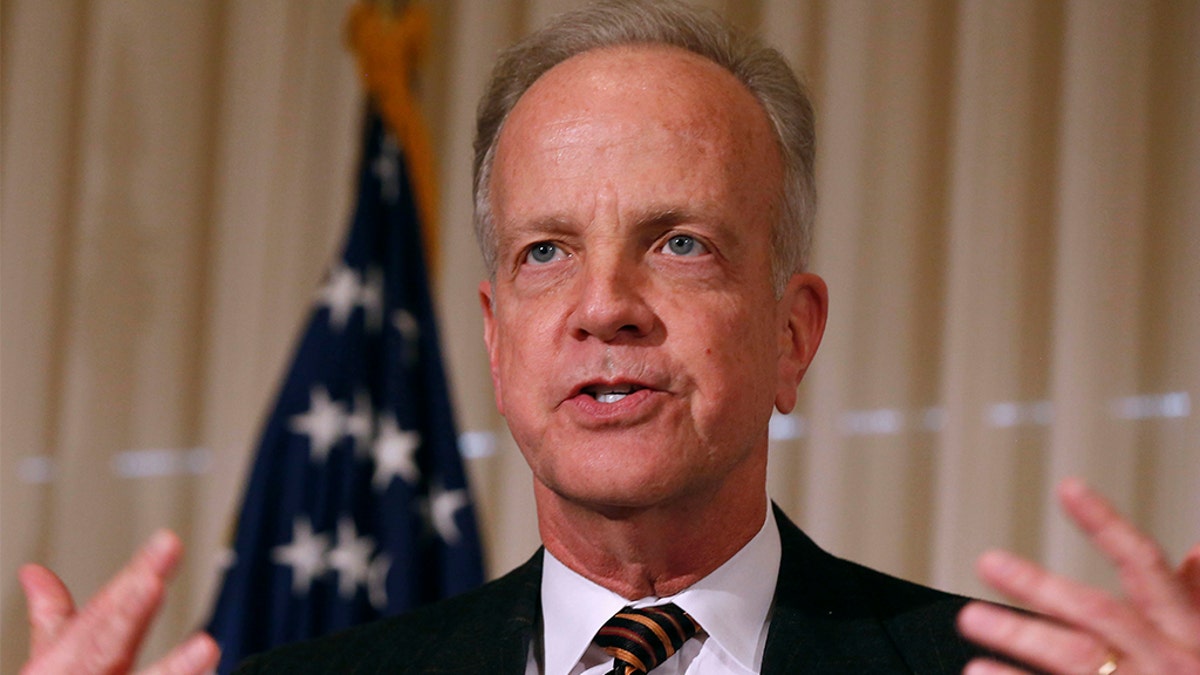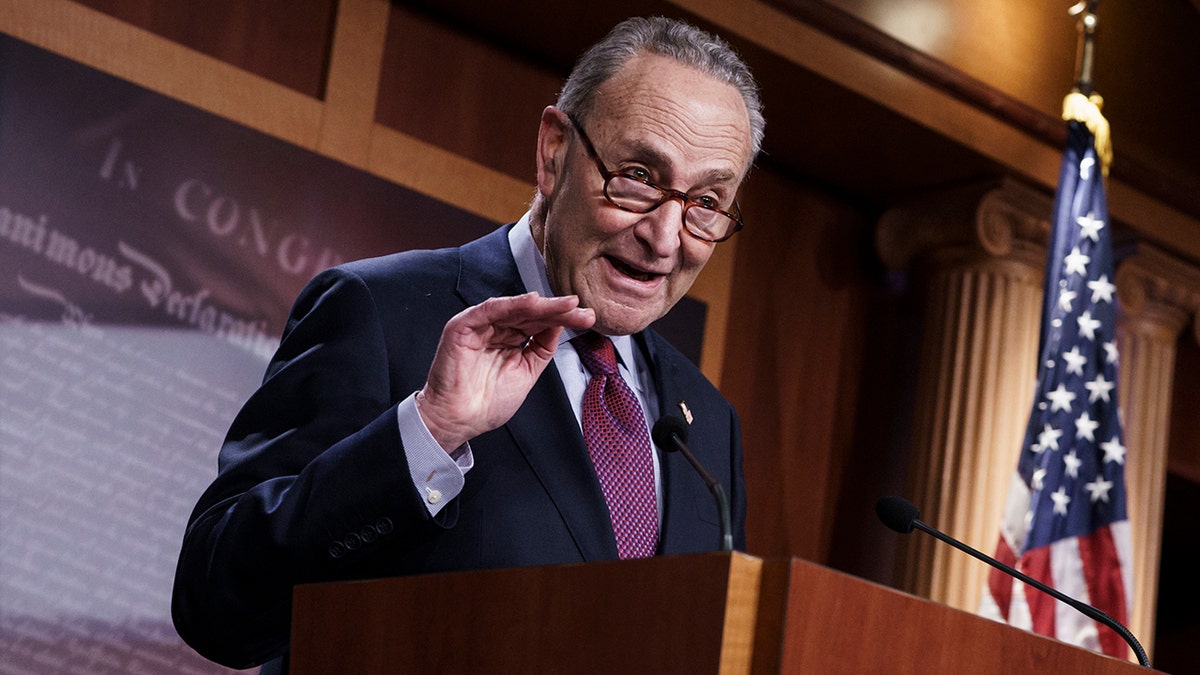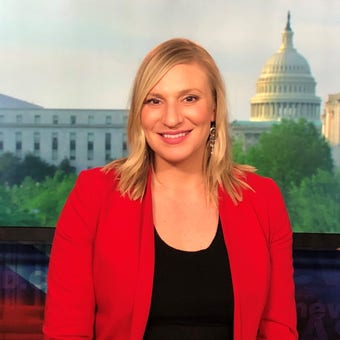Mitch McConnell: For the People Act designed to make 'easier to cheat'
Senate Minority Leader Mitch McConnell slams election reform bill
Senate Republicans have launched an all-out opposition effort to Democrats' signature voting reform legislation arguing democracy and the fate of the U.S. Senate are on the line.
At a press conference Wednesday, Senate Republicans said they are prepared to do whatever it takes to block the election and voting rights legislation, known as S.1, and predicted Democrats may get rid of the filibuster to usher in the landmark changes.
Sen. Tom Cotton, R-Ark., offered to stay on the Senate floor for long as it takes if Democrats implemented a new "talking filibuster" where the only way to block legislation would be to stand up and talk endlessly.
SCHUMER, MCCONNELL SPAR OVER DEMS' S1 ELECTION BILL DURING RARE COMMITTEE APPEARANCE: 'SHAME!'
"I join all my colleagues in saying there is no amount of time that I will not dedicate on the Senate floor to stopping the Democrats from passing this kind of radical legislation," Cotton said Wednesday, flanked by nearly a dozen Republicans at the Capitol.

UNITED STATES - MAY 19: Sen. Tom Cotton, R-Ark., is seen in the Capitol Visitor Center on Tuesday, May 19, 2020. (Photo By Tom Williams/CQ-Roll Call, Inc via Getty Images) (Getty Images)
Sen. Jerry Moran, R-Kan., also suggested Democrats would change the filibuster rules to try to pass a "monstrous bill" that would be "very damning to democracy."
"It also may become the circumstance in which ... the filibuster rule is set aside," Moran said. "It would be terrible, terrible for the United States of America and our citizens for the filibuster -- the 60 vote rule -- to be eliminated."

FILE: U.S. Senator Jerry Moran (R-KS) delivers remarks at the public launch of the U.S. Agriculture Coalition for Cuba while at the National Press Club in Washington, January 8, 2015. REUTERS/Larry Downing (UNITED STATES - Tags: POLITICS BUSINESS AGRICULTURE) - GM1EB190EF201 (REUTERS)
Currently, it takes 60 votes to advance most legislation in the Senate, but Democrats are under a lot of pressure from progressives to strike the filibuster rule so major legislation -- such as voting rights, gun control and immigration reform -- can pass with a simple majority vote.
But not all Democrats are on board with blowing up the filibuster, which supporters say forces bipartisan consensus and ensures rights for the minority party.
But both President Biden and moderate Sen. Joe Manchin, D-W.Va., have expressed an openness for reforming the silent filibuster into a "talking" one where the minority party would really have to work hard to grind Senate business to a halt.
HOUSE DEMOCRATS PASS EXTENSIVE VOTING AND CAMPAIGN FINANCE REFORM BILL, H.R. 1
Sen. Chuck Schumer, D-N.Y., said passing the voting rights legislation that already cleared the House is a top priority for Democrats. The bill is numbered "S. 1" to indicate its importance.
"S. 1 will pass this body," Schumer said during a floor speech Wednesday, though not detailing his plans for the filibuster.

Senate Majority Leader Chuck Schumer, D-N.Y., praises his Democratic Caucus at a news conference just after the Senate narrowly approved a $1.9 trillion COVID-19 relief bill, at the Capitol in Washington, Saturday, March 6, 2021. Senate passage sets up final congressional approval by the House next week so lawmakers can send it to President Joe Biden for his signature. (AP Photo/J. Scott Applewhite)
MCCONNELL SAYS DEMS TRYING TO USE POWER TO HELP 'WIN ELECTIONS IN PERPETUITY' WITH HR1, DC STATEHOOD
The legislation would enact automatic voter registration, restore voting rights to felons after they have completed their sentences and expand early voting access and absentee voting.
It also prohibits voter roll purges and partisan gerrymandering of congressional districts, imposes new campaign finance rules, and requires presidential nominees to release 10 years of tax returns.
The legislation takes aim at big-dollar donors and dark money in politics by requiring additional disclosure of campaign donors and disclaimers on political advertising.
A major pillar of the legislation is setting up a new public financing system for congressional and presidential elections to incentivize small-dollar donations. The legislation would establish a 6:1 match for each grassroots contribution to a candidate up to $200.
CLICK HERE TO GET THE FOX NEWS APP
The public match program would be funded by a new 4.75% surcharge on criminal and civil penalties and settlements that corporations pay to the U.S. government.
Republicans oppose the legislation on a number of fronts, arguing it takes away state control of elections, turns the Federal Election Commission into a partisan body and could make elections ripe for fraud by not mandating voter ID at the polls.






